Cease-fire supporters fall a vote short of victory amidst legislative agony
by Robert Lynch; February 10, 2024
“Globally is impacting locally. This is our chance to do something,”
Legislator Greg Mezey (D-Dryden)
“(Constituents ask), What in heck are you doing talking about foreign policy?”
Legislator Lee Shurtleff (R-Groton)
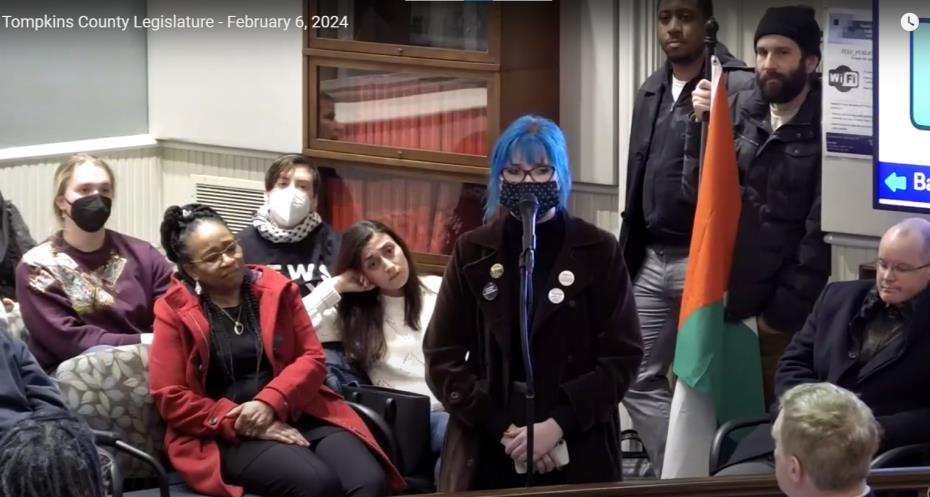
Pro-Palestinian partisans were dealt a decisive blow this week. No, it didn’t happen on the urban battlefields of the Gaza Strip. Defeat came instead within the comfortable confines of Tompkins County Legislative Chambers. For those committed activists who’d so passionately pressed their insurgency under the vaulted ceilings of the Gov. Daniel D. Tompkins Building, Tuesday may have marked the final setback and hastened their admission of defeat—maybe.
As they now have done for three meetings in a row, advocates for a Gaza Cease-Fire Resolution journeyed this past Tuesday to Legislative Chambers. They grabbed every chair, stood in the doorways, and trooped one-by-one to the nearest microphone to implore the County Legislature to do something; make an effort—one perhaps persuasive; more likely merely symbolic—to urge the quieting of conflict in the Middle East.
“The call that goes up for a cease-fire comes from the human heart,” Ithacan Claire Grady told lawmakers this latest Tuesday night, her comments typical among those who spoke. “Killing civilians is never OK; not one thousand, not ten thousand, not 30 thousand. And when it is being done in your name, you have a responsibility to take steps to stop it.”
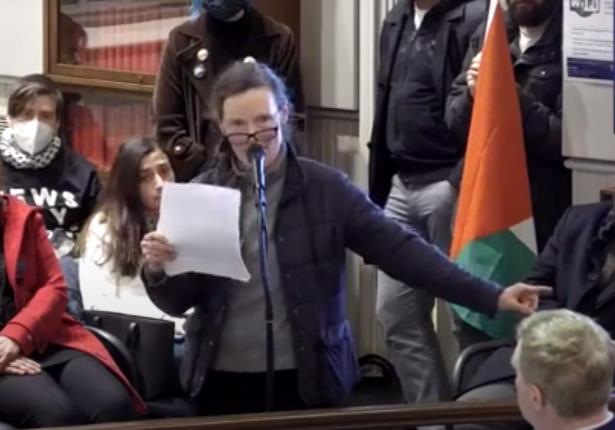
Activists insisted that those seated before them at mahogany desks should lean on Congress, President Biden, Prime Minister Netanyahu, and maybe just about anybody else with an ear to listen, to support an end to the Israeli-Hamas War, and to end the war now whether Israel wants to or not.
At this latest meeting, unlike at the last two sessions, proponents of peace had something to chew on. Four legislative Democrats, including Ulysses-Enfield’s Anne Koreman, had drafted a 12-paragraph, two-page “Urgent Humanitarian and Local Imperatives” initiative and put it on the evening’s agenda. The measure’s bullet points called for support of an Israel-Hamas cease-fire, the release of all civilian hostages by Hamas, and the “initiation of an international peace process to negotiate a two-state solution” in hopes of a lasting peace.
The resolution came close to passing, yet it didn’t.
Some thirty-eight public speakers took to the mics that night. Public comment consumed nearly two opening hours of the Legislature’s session. Lawmakers then followed with nearly an hour’s worth of trading words of their own. But when the clerk called the roll, the Koreman-backed Resolution lost by a single vote.
The Resolution secured a plurality, but not a majority. Seven voted in its favor; six opposed it. Lansing’s Deborah Dawson didn’t make the meeting, so affirmation never reached the eight-vote threshold.
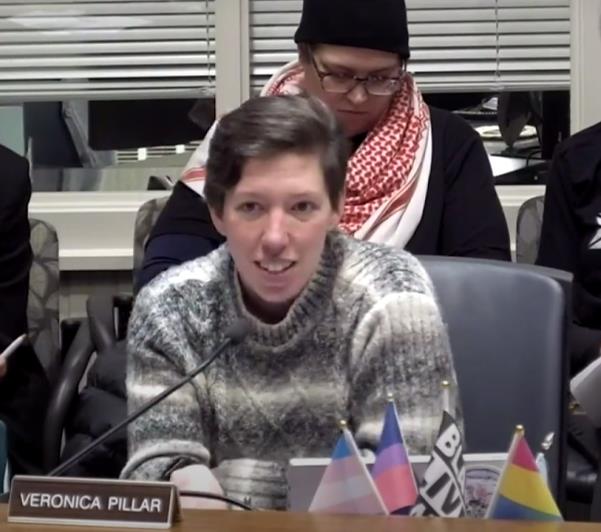
Though Dawson at a future session could seek reconsideration of what got voted down, she’s unlikely to do so. The Lansing Democrat has criticized like initiatives on prior occasions. She’s viewed the effort as ineffective posturing with words certain to fall on deaf ears.
“This is about life versus death and destruction,” Veronica Pillar, one of the three who assisted Koreman, spoke of the proposal she’d helped write. “Our constituents are not ignorant or deluded,” Pillar continued. “They know that we don’t directly change foreign policy. What they also know is that our statements ring louder than their statements.”
“Globally is impacting locally,” Resolution co-author Greg Mezey argued in defense of the Legislature’s weighing in on a war far away. “This is our chance to do something.”
“How anybody can think that taking a stand against—standing up for what’s right for humanity is not our place, I don’t understand that.”
Mezey spoke the longest; argued the hardest in favor of the measure that failed. He said he, Koreman, Pillar, and Travis Brooks had tried to make their submission even-handed; to deliberately moderate the more Palestinian-favoring, Israeli-critical position taken in a mid-December model document handed up by the Tompkins County Human Rights Commission. The Commission’s call had ignited the discussion that drew Palestine’s supporters to Legislature meetings beginning in early-January.
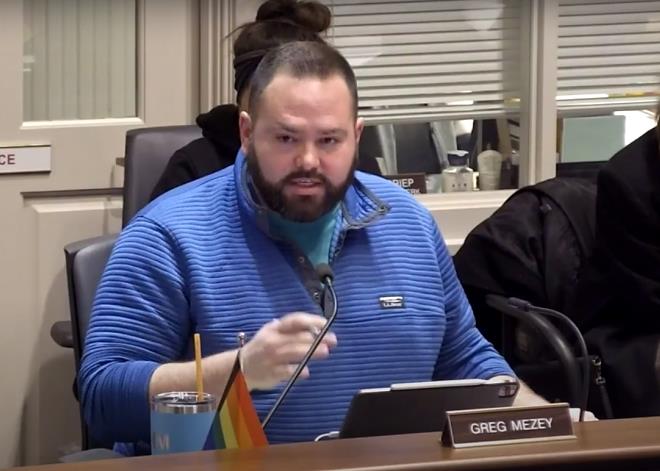
The Resolution is “very unbiased” and “a good place for us to start,” former Legislature Chair Shawna Black, one of the measure’s eventual seven supporters, stated. Black quoted a 12-year old Palestinian boy, who’d lived locally two years ago, but who’d sent her a post card urging that America should stop sending weapons to the conflict.
“I’m just asking my colleagues to think about our constituents,” Koreman commented. “You might not think it’s your job, but they’re asking us to do this.”
Well, maybe. Koreman’s assessment bases itself more on optics than a formal head count. To be sure, each of the 38 who turned out and spoke at the meeting that night supported a cease-fire and the Resolution endorsing it. But legislators also had received up to 700 letters and emails. And most of the writers, we’re told, had urged the Legislature not to get involved. Mezey sought to discount many of the written submissions, finding their pleadings repetitive and formulaic. He also said the objections had subsided once he and his three partners had toned-down the Human Rights Commission’s more partisan proposal.
“A Resolution like this will never make our constituents happy,” Mike Lane, the Legislature’s longest-serving member, opined. “It will make some constituents happy. It will make other constituents very unhappy.” Lane wondered aloud whether pro-Israeli speakers, present at earlier sessions but not lately, had felt “intimidated” to stay away by the hostile reception given them by Israel’s critics seated amongst them.
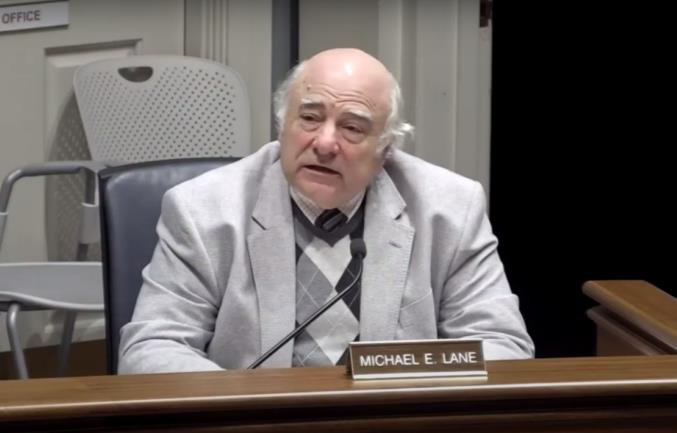
“I think that the best thing to do here is nothing, frankly,” Lane concluded, “because I don’t think this Resolution speaks to the majority of the people.”
Legislator Mike Sigler felt Mike Lane’s fears fell a little too close for comfort.
“Something else somebody said that concerned me was that they said they would ‘remember you in the street,’” Sigler recalled. “I’m not exactly sure how to take that.”
Sigler, a Republican now running for State Senate, also took issue with those he’d heard talking about Hamas “in colorful terms, in positive terms… as if those folks didn’t bear any responsibility for what happened.”
“I think cease-fire has been marketed as a word that’s very symbolic in this debate,” Sigler asserted. Sigler’s starting-point toward peace would be straightforward for Hamas: “Release the hostages; Step One. Do it today. That’s already a war crime from the jump… release them!”
Just about every legislator addressed the Cease-Fire Resolution last Tuesday. Ithaca’s Rich John reprised his opinion, stated days earlier in a committee meeting, that resolving foreign policy lies beyond his own skill set.
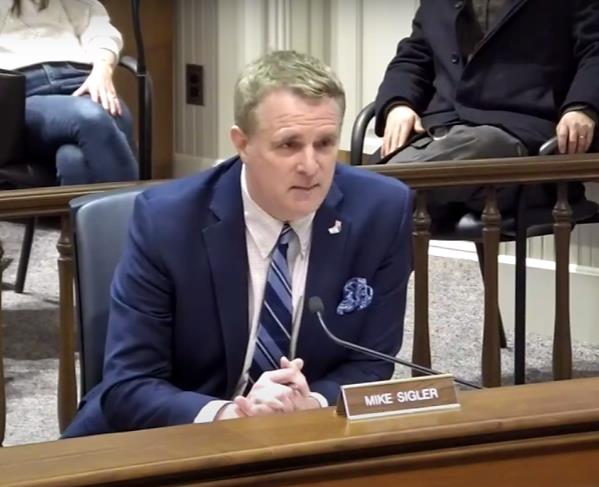
“We have none of the authority (that we) bring to a local issue on something like this,” John told colleagues and spectators. “We have no better judgement than those of you in this room,” he added. “I can’t tell you that this is the right course of action.”
Newfield’s Randy Brown insisted that regardless of how locals vote, Biden and Israel will do what they please, and the war will not end. Brown urged everyone to drop the recent time-wasting discussions, and get back to what local legislators were elected to do.
“Two-and-a-half hours we just spent on this; and the two hours before and the two hours before, and all the emails; I get the frustration and the helplessness of the people,” Brown acknowledged. “So my issue is local: Let’s spend two hours on homelessness. Let’s spend two hours on youth mental health, on youth programming; let’s focus on youth stuff.”
And to those in the gallery, our local legislator had some advice: “Help your neighbor and spend time on that.” Knock on a door; plow out a driveway, because, Brown said, “Nothing we do in this Resolution is going to help.”
From Brown’s cross-county district, Republican Lee Shurtleff, agreed.
“I’m not sure I can have a strong impact on changing foreign policy,” Shurtleff conceded. But repetitive, drawn-out discussions over a distant war, he said, have distracted him and others from local concerns like EMS coverage, food insecurity, airport revitalization, and an unresolved contract with corrections officers.
“I think there’s a lot here that we haven’t paid attention to for the last two or three months,” Shurtleff argued. “And I’m also listening to the constituents stopping me on the street and saying, ‘What in heck are you doing talking about foreign policy?’ And I have a lot of them asking me that question.”
Greg Mezey got the last word in before the vote. Nearly three hours into a meeting where this single topic dominated, Mezey’s passion rose to a near-boil.
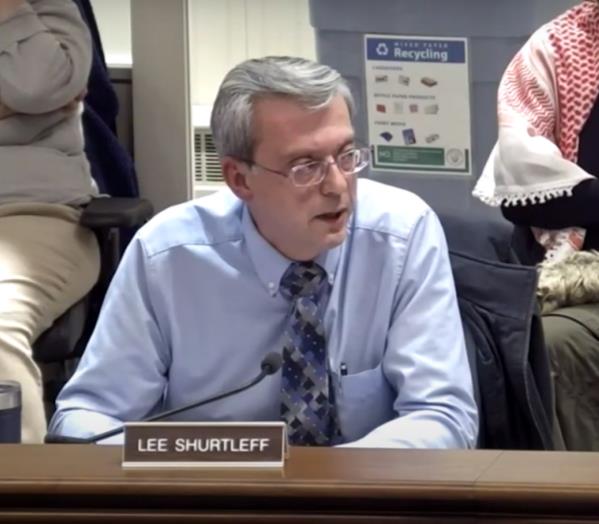
To Mike Lane: “Some people are going to be upset by some of us voting on the right side of history, and I’m OK with that.” (The gallery applauded.)
To Lee Shurtleff: “This is not comfortable. This is uncomfortable, and this job should be uncomfortable because every day should challenge us to do the right thing. Right now, this is what’s in front of us. We have the opportunity to do the right thing.”
To Randy Brown: “Tomorrow, gosh, I sure hope it’s homelessness; then I hope it’s child care; I hope it’s economic development, food security and all the other topics that we have to address. And I hope we give it as much time and we hear little to no complaint about the time we spend creating those subjects, because it’s equally as important.”
And to All: “So don’t have any shame. You’ve got to go to sleep at night. You have to sit with how you’re going to vote, and I respect that.”
Even had it secured Dawson’s unlikely endorsement, the Mezey-Koreman-Pillar-and-Brooks Resolution, passing by one vote or two, would never have commanded much persuasive power beyond the Tompkins County line. It might have quieted a conscience or two, but done little else. Face it; a recommendation that just squeaks by bears the consistency of oatmeal.
The Tompkins County Legislature reconvenes February 20th. Will the pro-Palestinian crowds return? Will their passion punch through? Will something revised be put onto the floor? Or will this just all die now? Principle has a way of outweighing pragmatism, of course. And for some, hope always springs eternal.
###

